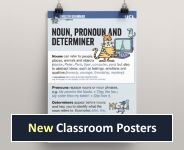Preposing
In this exercise you can see what happens when you move elements, particularly Direct Objects, earlier in the clause.
Welcome back!

Englicious is totally free for everyone to use!
But you will have to log in to see our library of teaching resources.
If you don’t have an account, that’s perfectly OK. You can register (for free).
It only takes a minute or two.
»
- Printer-friendly version
- Log in to view or leave comments

